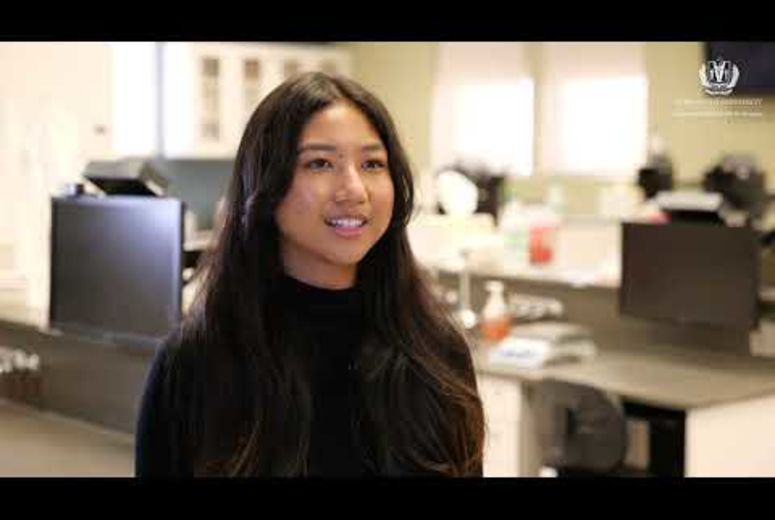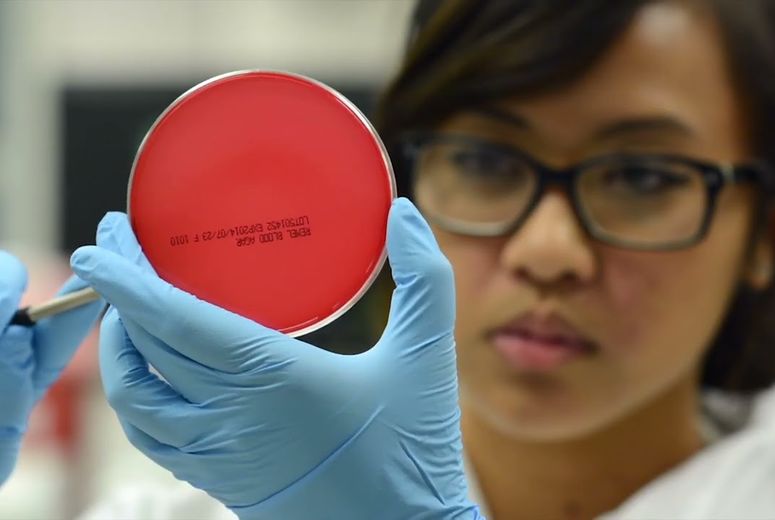Clinical Laboratory Science, B.S.
Professional Overview
The field of Clinical Laboratory Science is open to those who have an interest in medical science. The student who enters this allied health profession should show aptitude for mathematics and for the chemical and biological sciences.
The clinical laboratory scientist/medical technologist (CLS/MT) supervises or performs laboratory tests that aid the physician in the diagnosis and treatment of the patient's disease. Often these tests--in clinical chemistry, medical microbiology, parasitology, hematology, immunology, blood transfusion services, urinalysis, immunoassay, and other analysis--disclose subtle changes that might not be detected in any other way. Laboratory analysis requires that the technologist learn complex biotechnical theory and skills, including molecular diagnostics and molecular genetics.
Many CLS/MTs work in hospital clinical laboratories; others work in reference laboratories, biomedical or pharmaceutical companies, public health agencies, education, health informatics, or research in this country and abroad. Growth in the number of public and private medical facilities, the increased importance of laboratory tests for medical diagnosis, and the initiation of new government healthcare programs have created a need for more CLS/MTs.
Program Information
The Clinical Laboratory Science/Medical Technology (CLS/MT) program is offered in a “2+2" format. The freshman and sophomore years are completed at any other accredited college or university before coming to Loma Linda University, and students accepted into the program enter at the junior-year level.
Once enrolled in the Clinical Laboratory Science program at LLU, each student is assigned a faculty advisor. The faculty advisor serves as a resource for issues related to registration, degree completion requirements, and locating other resources available on campus. The faculty advisor can also assist with academic, professional, and personal issues. Sensitive issues are handled in a confidential and impartial manner, and the student may be referred to the Student Assistance Program and Counseling Services if the student requires or requests additional assistance.
The junior year is a full-time ten-month program of lecture and laboratory. Emphasis is on the core clinical laboratory science courses necessary for CLS/MT licensure.
The senior year is a full-time ten-month clinical practicum (40 hours/week) that provides professional clinical experience in the hospital laboratory environment. Emphasis is on technical proficiency, organization, and the laboratory's relationship to patient care. Clinical training is coordinated with the Loma Linda University Medical Center’s laboratory and with supplemental training laboratories in the community. Transportation to supplemental training laboratories is the responsibility of the student. Depending on the clinical assignment, commuting times may be up to 80 miles one way.
After demonstrating proficiency, students may be expected to perform testing procedures during scheduled clinical training with qualified supervision. Staffing patterns may be altered to accommodate this student experience, however, in accordance with the program’s service-work policy, students shall not take the place of qualified staff on a long-term basis.
After satisfactory completion of the program, the student is awarded a Bachelor of Science degree. Graduates are immediately eligible to take national board exams and apply to the state for licensure. Most graduates find employment within weeks of beginning the job search.
Our Mission, Goals, and Objectives
The Clinical Laboratory Science program is dedicated to fulfilling the motto of the School of Allied Health Professions, "To Lead, To Heal, To Serve" through providing academic and clinical experiences where students strive for excellence in their work, integrity, and ethical relationships that help contribute to the health and well-being of patients.
The Clinical Laboratory Science (CLS) Program is part of the School of Allied Health Professions at Loma Linda University. The goals of the school and the department for this program are as follows:
- To provide opportunities, instruction, and guided experiences enabling the student to acquire basic knowledge and attain technical ability essential to the practice of their chosen profession.
- To help the student accept responsibility for integrity, ethical relationships, and empathic attitudes that contribute to the welfare and well-being of patients.
- To help the student develop a background of information and attitudes conducive to interprofessional understanding and cooperation.
- To encourage the student to cultivate habits of self-education that will foster lifelong professional growth.
- To engender and nurture in the student the desire to serve mankind, and in particular, to serve as needed in the medical centers sponsored by the Seventh-day Adventist church, both in the United States and abroad.
We endeavor to present a complete educational experience in clinical laboratory science which culminates in a Baccalaureate of Science degree in Clinical Laboratory Science. The education and clinical experience obtained in this program will give the student the eligibility to take the medical laboratory scientist examination offered by the ASCP National Board of Certification, which is approved by the State of California for CLS licensure. The Bachelor’s Degree in CLS is granted independent of any external certification or licensing examinations. The graduate will demonstrate professional entry level competencies in chemistry, hematology, immunohematology, immunology, and microbiology and their respective sub-sections.
Career Entry Competencies
Upon graduation and initial employment, the clinical laboratory scientist should be proficient in:
- Establishing procedures for collecting and processing biological specimens for analysis;
- Performing analytical tests on body fluids, cells, and blood products;
- Integrating and relating data generated by the various clinical laboratory departments while making judgments regarding possible discrepancies; confirming abnormal results, verifying quality control procedures; and developing solutions to problems concerning the generation of laboratory data;
- Making judgments concerning the results of quality control measures and instituting proper procedures to maintain accuracy and precision;
- Evaluating new techniques, instruments, and procedures in terms of their usefulness and practicality within the context of a given laboratory's personnel, equipment, space, and budgetary resources;
- Demonstrating professional conduct and interpersonal communication skills with patients, laboratory personnel, other health professionals, and with the public;
- Recognizing and acting upon individual needs for continuing education as a function of growth and maintenance of professional competence;
- Leading supportive personnel and peers in their acquisition of knowledge, skills, and attitudes;
- Applying principles of management and supervision; and
- Applying principles of education methodology.
Learning Outcomes
Students will meet the following Program Learning Outcomes:
- Demonstrate basic knowledge essential to the practice of Clinical Laboratory Science.
- Demonstrate technical ability essential to the practice of Clinical Laboratory Science.
- Practice professionalism through ethical behavior and attitudes.
- Demonstrate leadership and administrative skills in laboratory practice and the community, consistent with the mission of the School of Allied Health Professions.
- Adhere to rules and regulations promoting workplace and patient safety and Continuous Quality Improvement (CQI).
- Exhibit analytical and critical thinking skills necessary to succeed in laboratory medicine.
Program Accreditation and Approval
Program Accreditation
National Accrediting Agency for Clinical Laboratory Science (NAACLS)
5600 N River Road Suite 720
Rosemont, Il 60018
Phone: (773) 714-8800
Email: [email protected]
Web: https://naacls.org/
State Approval
California Department of Public Health
Laboratory Field Services
850 Marina Bay Parkway,
Bldg, P 1st Floor
Richmond CA 94804
Phone: (510) 620-3800
Clinical Affiliates
Loma Linda University Medical Center
11234 Anderson Street
Loma Linda, California 92350
Loma Linda University-Murrieta
28062 Baxter Rd
Murrieta, CA 92563
Lifestream
384 Orange Show Road
San Bernardino, California 92408
Community Hospital of San Bernardino
1805 Medical Center Drive
San Bernardino, California 92411
Jerry L. Pettis Veteran's Memorial Medical Center
11201 Benton Avenue
Loma Linda, California 92354
Kaiser Permanente
Fontana Medical Center
9961 Sierra Avenue
Fontana, California 92335
Pomona Valley Hospital Medical Center
1798 N Garey Ave.
Pomona, CA 91767
Clinical Placement - Second Year Requirements Note
Clinical placement during the second year requires a valid Clinical Laboratory Scientist Trainee license issued by the California Department of Public Health. While the trainee license is not required to apply to the program, a social security number (SSN) or individual taxpayer identification number is required to complete the application for the CLS trainee license.
Transportation to supplemental training laboratories is the responsibility of the student.


